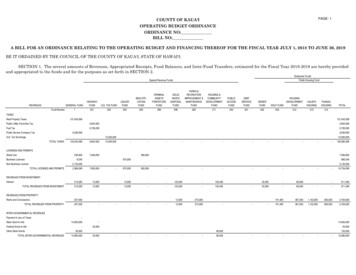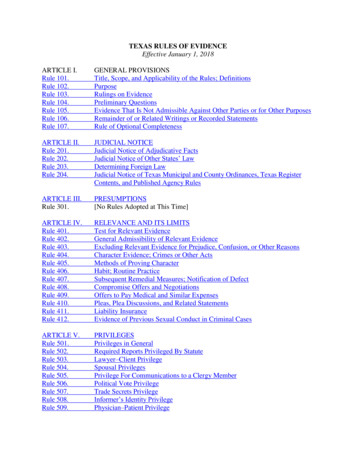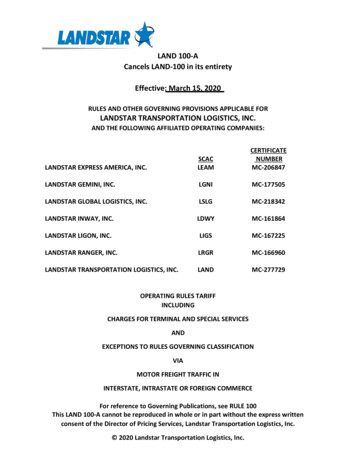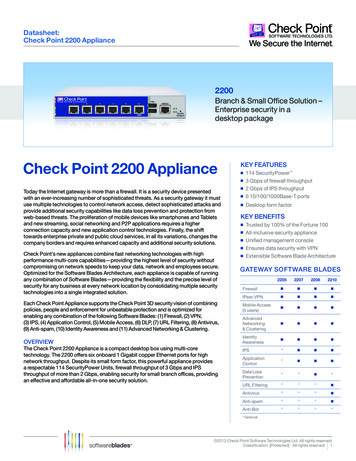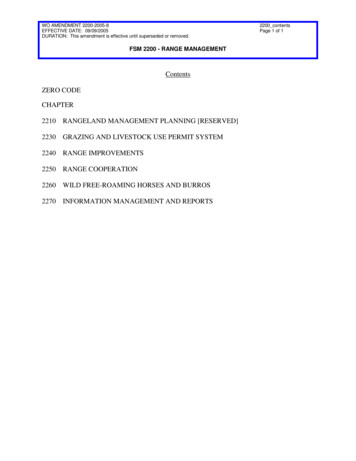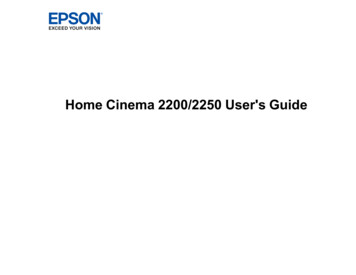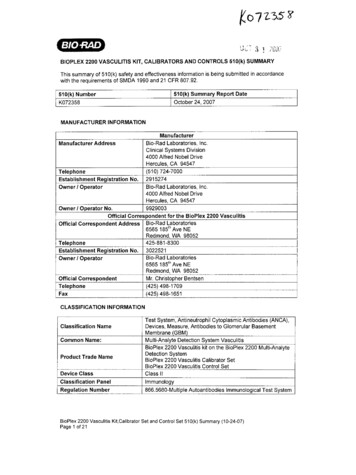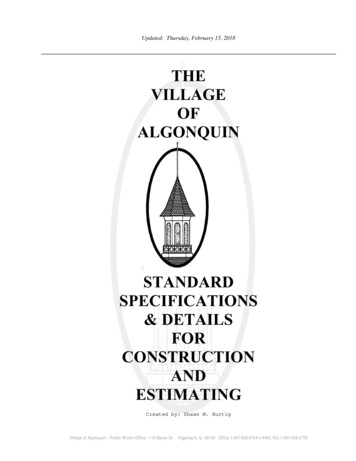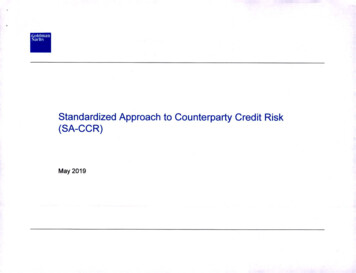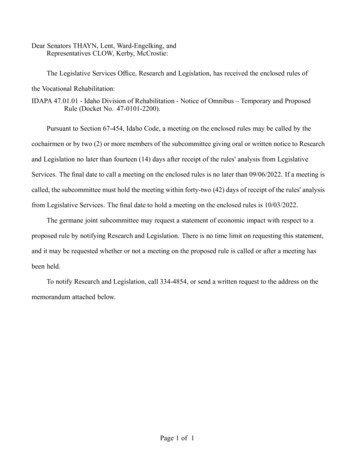
Transcription
Dear Senators THAYN, Lent, Ward-Engelking, andRepresentatives CLOW, Kerby, McCrostie:The Legislative Services Office, Research and Legislation, has received the enclosed rules ofthe Vocational Rehabilitation:IDAPA 47.01.01 - Idaho Division of Rehabilitation - Notice of Omnibus – Temporary and ProposedRule (Docket No. 47-0101-2200).Pursuant to Section 67-454, Idaho Code, a meeting on the enclosed rules may be called by thecochairmen or by two (2) or more members of the subcommittee giving oral or written notice to Researchand Legislation no later than fourteen (14) days after receipt of the rules' analysis from LegislativeServices. The final date to call a meeting on the enclosed rules is no later than 09/06/2022. If a meeting iscalled, the subcommittee must hold the meeting within forty-two (42) days of receipt of the rules' analysisfrom Legislative Services. The final date to hold a meeting on the enclosed rules is 10/03/2022.The germane joint subcommittee may request a statement of economic impact with respect to aproposed rule by notifying Research and Legislation. There is no time limit on requesting this statement,and it may be requested whether or not a meeting on the proposed rule is called or after a meeting hasbeen held.To notify Research and Legislation, call 334-4854, or send a written request to the address on thememorandum attached below.Page 1 of 1
Terri KondeffDirectorMEMORANDUMTO:Rules Review Subcommittee of the Senate Education Committee and the House EducationCommitteeFROM:Principal Legislative Drafting Attorney - Elizabeth BowenDATE:August 18, 2022SUBJECT: Vocational RehabilitationIDAPA 47.01.01 - Idaho Division of Rehabilitation - Notice of Omnibus -- Temporary and Proposed Rule(Docket No. 47-0101-2200)Summary and Stated Reasons for the RuleThis temporary and proposed rule, an omnibus rule, governs vocational rehabilitation services. The rulewas previously submitted to and reviewed by the Legislature. The Governor finds that the temporary rule isjustified to protect public health and safety and to confer a benefit.Negotiated Rulemaking / Fiscal ImpactNegotiated rulemaking was not conducted, as this is a previously existing rule. The rule is not anticipatedto have a negative fiscal impact on the state general fund.Statutory AuthorityThis rule appears to be authorized by several sections of the Idaho Code.cc: Vocational RehabilitationTracie Bent*** PLEASE NOTE ***Per the Idaho Constitution, all administrative rules may be reviewed by the Legislature during the next legislative session. The Legislature has 3 options with this rulemaking docket: 1) Approve the docket in its entirety;2) Reject the docket in its entirety; or 3) Reject the docket in part.Paul Headlee, Deputy Director Kristin Ford, Manager Keith Bybee, Manager April Renfro, Manager Glenn Harris, ManagerLegislative Services OfficeResearch & Legislation Budget & Policy AnalysisLegislative AuditsInformation TechnologyStatehouse, P.O. Box 83720Boise, Idaho 83720–0054Tel: 208–334–2475legislature.idaho.gov
IDAPA 47 – IDAHO DIVISION OF VOCATION REHABILITATIONDOCKET NO. 47-0101-2200NOTICE OF OMNIBUS RULEMAKING – TEMPORARY AND PROPOSED RULEEFFECTIVE DATE: The effective date of the temporary rule being adopted through this omnibus rulemaking aslisted in the descriptive summary of this notice is July 1, 2022.AUTHORITY: In compliance with Sections 67-5221(1) and 67-5226, Idaho Code, notice is hereby given that thisagency has adopted a temporary rule, and proposed rulemaking procedures have been initiated. The action isauthorized pursuant to Article IX, Section 2 of the Idaho Constitution, Sections 33-101, 33-105, 33-2303, IdahoCode, and the Rehabilitation Act of 1973, as amended by the Workforce Innovation and Opportunity Act (WIOA).PUBLIC HEARING SCHEDULE: Oral comment concerning this rulemaking will be scheduled in accordance withSection 67-5222, Idaho Code. If scheduled, the hearing site(s) will be accessible to persons with disabilities andrequests for accommodation are made not later than five (5) days prior to the hearing, to the agency address below.DESCRIPTIVE SUMMARY: The following is the required finding and concise statement of its supporting reasonsfor adopting a temporary rule and a nontechnical explanation of the substance and purpose of the proposedrulemaking:This temporary and proposed rulemaking adopts and publishes the following rule chapter previously submittedto and reviewed by the Idaho Legislature under IDAPA 47, rules of the Idaho Division of Vocation Rehabilitation:IDAPA 47 47.01.01, Rules Governing Vocational Rehabilitation Services.TEMPORARY RULE JUSTIFICATION: Pursuant to Sections 67-5226(1)(a)-(c), Idaho Code, the Governor hasfound that temporary adoption of the rule is appropriate for the following reasons:This temporary rule is necessary to protect the public health, safety, and welfare of the citizens of Idaho andconfer a benefit on its citizens. The temporary rule chapter implements the duly enacted laws of the state of Idaho,provides citizens with the detailed rules and standards for complying with those laws, and assists in the orderlyexecution and enforcement of those laws. The expiration of this rule chapter without due consideration and processeswould undermine the public health, safety and welfare of the citizens of Idaho and deprive them of the benefitintended by this rule.FEE SUMMARY: The following is a specific description of the fee or charge imposed or increased: NAFISCAL IMPACT: The following is a specific description, if applicable, of any negative fiscal impact on the stategeneral fund greater than ten thousand dollars ( 10,000) during the fiscal year: This rulemaking is not anticipated tohave any fiscal impact on the state general fund because the FY2023 budget has already been set by the Legislature,and approved by the Governor, anticipating the existence of the rule chapter(s) being reauthorized by this rulemaking.NEGOTIATED RULEMAKING: Pursuant to Section 67-5220(2), Idaho Code, negotiated rulemaking was notfeasible because engaging in negotiated rulemaking for all previously existing rules will inhibit the agency fromcarrying out its ability to serve the citizens of Idaho and to protect their health, safety, and welfare.INCORPORATION BY REFERENCE: Pursuant to Section 67-5229(2)(a), Idaho Code, incorporated materialmay be obtained or electronically accessed as provided in the text of the proposed rule attached hereto.ASSISTANCE ON TECHNICAL QUESTIONS, SUBMISSION OF WRITTEN COMMENTS: For assistanceon technical questions concerning the temporary and proposed rule, contact Teresa Pitt, Planning and EvaluationManager at (208)287-6466 or teresa.pitt@vr.idaho.gov; or Tracie Bent, Chief Planning and Policy Officer at(208)332-1582 or tracie.bent@osbe.idaho.gov.Idaho Administrative BulletinPage 252July 6, 2022 – Vol. 22-7
IDAHO DIVISION OF VOCATION REHABILITATIONDocket No. 47-0101-2200IDAPA 47Omnibus Notice – Temporary & Proposed RuleAnyone may submit written comments regarding the proposed rulemaking. All written comments must bedirected to the undersigned and must be delivered within twenty-one (21) days after publication of this Notice in theIdaho Administrative Bulletin. Oral presentation of comments may be requested pursuant to Section 67-5222(2),Idaho Code, and must be delivered to the undersigned within fourteen (14) days of the date of publication of thisNotice in the Idaho Administrative Bulletin.DATED this July 6, 2022.Tracie BentChief Planning and Policy OfficerIdaho State Board of Education650 W State StreetPO Box 83720Boise, Idaho 83720-0037(208)332-1582THE FOLLOWING IS THE TEMPORARY RULE AND THE PROPOSED TEXTOF OMNIBUS RULEMAKING DOCKET NO. 47-0101-2200(New Chapter)47.01.01 – RULES GOVERNING VOCATIONAL REHABILITATION SERVICES000.LEGAL AUTHORITY.Article IX, Section 2 of the Idaho Constitution, Section 33-2303, Idaho Code and the Rehabilitation Act of 1973, asamended by the Workforce Innovation and Opportunity Act (WIOA). (Public Law 113-128).(7-1-22)T001.SCOPE.The provision of these rules is to establish the procedures, program requirements and to implement program changesnecessitated by the Rehabilitation Act of 1973, as amended, which address the provision of vocational rehabilitationservices to the disability population of Idaho.(7-1-22)T002.CONFIDENTIAL RECORDS.All personal information concerning the Division’s customers is confidential. The information is used only forpurposes directly connected to the administration of Vocational Rehabilitation services, and may not be releasedwithout the informed, written consent of the customer, except as otherwise provided by law.(7-1-22)T003. – 009.010.(RESERVED)DEFINITIONS.01.Customer. Any individual who has applied for or is eligible for vocational rehabilitation services.(7-1-22)T02.Division. The Idaho Division of Vocational Rehabilitation.(7-1-22)T03.Informed Choice. To make an informed choice, customers need accurate, clear, and usefulinformation to make decisions regarding their vocational goal, necessary services and options for selecting approvedservice providers to reach their goal.(7-1-22)T04.Vocational Rehabilitation Counselor. A professional staff member of the Division whodetermines customer eligibility and the provision of vocational rehabilitation services.(7-1-22)TIdaho Administrative BulletinPage 253July 6, 2022 – Vol. 22-7
IDAHO DIVISION OF VOCATION REHABILITATIONDocket No. 47-0101-2200IDAPA 47Omnibus Notice – Temporary & Proposed Rule011.ABBREVIATIONS.01.012. – 099.IPE. Individualized Plan for Employment.(7-1-22)T(RESERVED)100.CUSTOMER APPEALS.In accordance with 34 CFR 361.57, the customer appeals process is governed by Sections 101-103 of these rules.(7-1-22)T101.INFORMAL REVIEW PROCESS.An informal review process is an optional informal process to resolve disagreements or dissatisfaction with services.An individual may request an informal review within twenty-one (21) calendar days of the agency’s notice regardingthe provision or denial of services. The request must be in writing to the regional manager and describe the complaint.The regional manager will function as the administrative review officer in this process. At the customer’s writtenrequest another regional manager may be substituted. The reviewer will be responsible for:(7-1-22)T01.Advising the Customer. Inform the customer of their right to representation and services availablethrough the client assistance program.(7-1-22)T02.Conducting the Review. The review will be conducted within twenty-one (21) calendar daysfollowing receipt of a written request, unless both parties agree to an extension.(7-1-22)T03.Documented Effort. The Division may extend the informal review period when the customermakes a documented effort to utilize the client assistance program or another advocate to resolve the dissatisfaction.(7-1-22)T04.Review Location. The review will be held at a time and location convenient to the customer,generally at a Division office.(7-1-22)T05.customer.Communication Method. Communication will be provided in the most appropriate method for the(7-1-22)T06.Transportation. Transportation will be provided to and from the review site, if practicable.(7-1-22)T07.Informal Review Decision. The regional manager or designee will provide a written decision afterconducting the informal review. The customer may request mediation or fair hearing within twenty-one (21) calendardays of the informal review written decision.(7-1-22)T102.MEDIATION.Mediation is an alternate dispute resolution method available to applicants and eligible customers who initiate theformal appeals process or when the informal review did not resolve the customer’s concern.(7-1-22)T01.Timeline. A customer may request mediation as long as the request is made within twenty-one (21)calendar days of the original or informal review decision.(7-1-22)T02.Written Request. Requests for mediation must be made in writing to the field services chief andstate the reason for dissatisfaction with the decision. The field services chief will represent the Division or assign amanagement level staff member who was not involved in the decision.(7-1-22)T03.Participation. Mediation is voluntary, either party may reject mediation. Once mediation has beenaccepted, either party may terminate the mediation process.(7-1-22)T04.Right to Fair Hearing. Mediation may not be used to deny or delay the customer’s right to pursuea fair hearing. Should the customer and/or designated representative select mediation in lieu of a fair hearing, theoption for a fair hearing will be extended to allow the results of mediation to be established. Once the final mediationIdaho Administrative BulletinPage 254July 6, 2022 – Vol. 22-7
IDAHO DIVISION OF VOCATION REHABILITATIONDocket No. 47-0101-2200IDAPA 47Omnibus Notice – Temporary & Proposed Ruleresults are determined, the customer retains the right to request a fair hearing.(7-1-22)T05.Mediator. All mediation is conducted by a qualified and impartial mediator who is selectedrandomly from a list maintained by the Division.(7-1-22)T06.Confidentiality. Mediation discussions are confidential and may not be used as evidence in a fairhearing. Both parties will sign a confidentiality agreement.(7-1-22)T07.Mediation Agreement. The mediator will develop a written mediation agreement if an agreementbetween the parties is reached. The agreement must be signed by all parties involved in the mediation.(7-1-22)T08.Cost. Cost of mediation is paid by the Division, except for customer representation.(7-1-22)T103.FAIR HEARING PROCESS.An option available to any customer who is dissatisfied with any determination made by Division personnel thataffects the provision of vocational rehabilitation services. A customer may request a fair hearing immediately withoutgoing through any other appeal steps. A customer or if appropriate their representative may request a timely review ofthe determination. Such requests must be made within twenty-one (21) calendar days of the Division’s decisionresulting in the initial disagreement or within twenty-one (21) calendar days of the conclusion of the informal reviewor mediation process, whichever is later. The fair hearing will be conducted by a fair hearing officer.(7-1-22)T01.Written Request. Requests for a fair hearing must be submitted in writing to the field serviceschief and state the customer’s dissatisfaction with the agency’s decision.(7-1-22)T02.Timeline. The hearing will be conducted within sixty (60) calendar days of receipt of theindividual’s request, unless resolution is achieved prior to the 60th day, or both parties agree to a specific extension oftime.(7-1-22)T03.Fair Hearing Officers. The Division Administrator, or designee, and the State RehabilitationCouncil will jointly maintain a list of fair hearing officers. The Administrator and the customer will select the fairhearing officer from the list.(7-1-22)T04.Written Report. The fair hearing officer will issue a written report of the decision within thirty(30) calendar days of the completion of the hearing.(7-1-22)T05.Decision. The decision of the fair hearing officer will be considered final by the Division.(7-1-22)T06.Dispute. Any party who disagrees with the decisions of a fair hearing officer will have the right tobring a civil action with respect to the matter in dispute. The action may be brought in any state court of competentjurisdiction or in a district court of the United States of competent jurisdiction without regard to the amount incontroversy.(7-1-22)T104. – 199.200.(RESERVED)REFERRAL AND APPLICATION FOR SERVICES.01.Referral. The Division will attempt contact within seven (7) business days after receipt of areferral request and will make a minimum of three (3) attempts to contact the individual before closing the referral.(7-1-22)T02.Application for Services. The application process includes the following; an individual must signand date an application or make a request for alternate application, provide necessary information to begin anassessment of eligibility, including information gathered in the intake interview, and the customer is determined to beavailable and free of restrictions to complete the assessment process for determining eligibility for Division services.(7-1-22)TIdaho Administrative BulletinPage 255July 6, 2022 – Vol. 22-7
IDAHO DIVISION OF VOCATION REHABILITATIONDocket No. 47-0101-2200IDAPA 47Omnibus Notice – Temporary & Proposed Rulea.Residency Requirement. There is no duration of residency required to apply for Division services.Individuals must be present in the state of Idaho and legally able to work in the United States (i.e., non-U.S. citizensmust show they are legally able to work within the United States).(7-1-22)Tb.Other Requirements. Customers must be available to participate in the eligibility determinationprocess and will be informed of their rights and responsibilities as a customer of the program.(7-1-22)T201.ELIGIBILITY REQUIREMENTS.Eligibility for vocational rehabilitation services is based upon the following criteria:01.by qualified;(7-1-22)TDocumentation of Impairment. The customer has a physical or mental impairment documented(7-1-22)T02.Documentation of Impediment. A determination by qualified personnel that the customer’sphysical or mental impairment constitutes a substantial impediment to employment;(7-1-22)T03.Determination of Need for Services. A determination by qualified personnel employed by theDivision, that the customer requires vocational rehabilitation services to prepare for, secure, retain, advance in, orregain employment consistent with the applicant’s unique strengths, resources, priorities, concerns, abilities,capabilities, interests, and informed choice.(7-1-22)T04.Presumption of Benefit. The Division presumes that a customer who meets the eligibilityrequirements, can benefit in terms of an employment outcome, unless the severity of disability places thispresumption of benefit in question, pursuant CFR 361.42(e).(7-1-22)T202.PRESUMPTIVE ELIGIBILITY.Individuals eligible for Social Security benefits under Title II or Title XVI of the Social Security Act, based upontheir disability, are presumed to meet the eligibility requirements for vocational rehabilitation services, unless thevocational rehabilitation counselor questions the individual’s ability to benefit from vocational rehabilitation servicesdue to the severity of the individual’s disability.(7-1-22)T203.SEVERITY OF DISABILITY.At the time a customer is determined eligible for vocational rehabilitation services, a determination of the severity ofdisability, as it relates to employment, will also be determined. A priority category assignment will be determined forall eligible individuals, in one (1) of the following categories:(7-1-22)T01.Priority Category 1 - Eligible Individuals with the Most Significant Disabilities (MSD).(7-1-22)Ta.Meets criteria established for a customer with a significant disability; and(7-1-22)Tb.Experiences a severe physical and/or mental impairment that seriously limits three (3) or morefunctional categories (such as mobility, work skills, self-care, interpersonal skills, communication, self-direction orwork tolerance) in terms of an employment outcome; and(7-1-22)Tc.period of time.Requires multiple primary Individualized Plan for Employment (IPE) services over an extended(7-1-22)T02.Priority Category 2 - Eligible Individuals with Significant Disabilities (SD).(7-1-22)Ta.Meets the criteria for a customer with no significant disability; and(7-1-22)Tb.Experiences a severe physical and/or mental impairment that seriously limits one (1) or morefunctional categories (such as mobility, work skills, self-care, interpersonal skills, communication, self-direction orwork tolerance) in terms of an employment outcome; and(7-1-22)Tc.Requires multiple primary IPE services over an extended period of time.Idaho Administrative BulletinPage 256(7-1-22)TJuly 6, 2022 – Vol. 22-7
IDAHO DIVISION OF VOCATION REHABILITATIONDocket No. 47-0101-2200IDAPA 47Omnibus Notice – Temporary & Proposed Rule03.Priority Category 3 - All other Eligible Individuals with Disabilities (D).(7-1-22)Ta.Has a physical or mental impairment; and(7-1-22)Tb.Impairment constitutes or results in a substantial impediment to employment; and(7-1-22)Tc.Who can benefit in terms of an employment outcome from the provision of vocationalrehabilitation services.(7-1-22)T204.INDIVIDUALIZED PLAN FOR EMPLOYMENT.01.IPE Requirements. An eligible customer, or their representative, may develop all or part of theirIPE, with or without assistance from the Division, however the IPE must be agreed to by a qualified rehabilitationprofessional. The Division will not pay for IPE development services from other providers. The customer is given acopy of the signed IPE and any subsequent IPEs. There will be only one (1) active IPE at any given time. TheDivision supports vocational goals in competitive integrated employment, including supported employment and selfemployment. The IPE will contain the mandatory components per 34 CFR 361.46.(7-1-22)T02.Annual IPE Review. IPEs will be reviewed at least once annually.(7-1-22)T205.CASE CLOSURE.The Division may close a customer’s case at any time in the vocational rehabilitation process for various reasons, incompliance with federal regulations as stated in 34 CFR 361.43, 44, and 56 and federal reporting guidelines. Generalreasons for case closure may occur when the vocational rehabilitation counselor determines that a customer is eithernot eligible or no longer eligible for vocational rehabilitation services; is unavailable to participate in the vocationalrehabilitation program; declines to participate in the vocational rehabilitation program; or the customer achieves anemployment outcome. Regardless of when in the process the record of service is closed, the vocational rehabilitationcounselor must make reasonable attempts to contact the individual, or as appropriate their representative, prior to caseclosure to discuss the pending case closure. A closure letter or appropriate form of communication will be sent toindividuals whose case is being closed.(7-1-22)T206.ORDER OF SELECTION.01.Order of Selection. When the Division cannot provide the full range of vocational rehabilitationservices to all eligible customers because of fiscal or personnel capacity constraints, the agency will enter an order ofselection. The order of selection will be based on the following requirements:(7-1-22)Ta.Students with disabilities, as defined by 34 CFR 361.5(c)(51), who received pre-employmenttransition services prior to eligibility determination and assignment to a disability priority category will continue toreceive such services.(7-1-22)Tb.All customers who have an Individualized Plan for Employment will continue to be served.(7-1-22)T02.Priority Status. Priority will be given to eligible individuals with the most significant disabilities,followed by those with significant disabilities, and finally those eligible individuals with disabilities. All eligiblecustomers will be assigned to one (1) of the priority categories as outlined in Section 203 of these rules. (7-1-22)T03.When Unable to Serve Eligible Individuals. If the Division cannot serve all eligible individualswithin a given priority category, individuals will be released from the statewide waitlist based on disability prioritycategory and date of application.(7-1-22)T04.Employment Maintenance. The Division will serve individuals who are in immediate jeopardy oflosing their employment and who require specific services or equipment to maintain employment, regardless ofseverity of disability category assignment, in accordance with 34 CFR 361.36.a(3)(v).(7-1-22)TIdaho Administrative BulletinPage 257July 6, 2022 – Vol. 22-7
IDAHO DIVISION OF VOCATION REHABILITATIONDocket No. 47-0101-2200IDAPA 47Omnibus Notice – Temporary & Proposed Rule207. – 299.(RESERVED)300.FINANCIAL PARTICIPATION REQUIREMENTS.The Division will consider the financial participation of an eligible customer for the purposes of determining theextent of their participation in the costs of vocational rehabilitation services in accordance with 34 CFR 361.54.Financial participation will not be a consideration in the determination of eligibility for vocational rehabilitationservices but will be a consideration in allocating the cost of vocational rehabilitation services, except those servicesdescribed in 34 CFR 361.54(b)(3).(7-1-22)T01.Financial Participation Assessment. Financial participation will be assessed after eligibility andprior to IPE implementation, prior to a plan amendment, on an annual basis or if a customer’s financial circumstanceschange significantly, whichever occurs sooner.(7-1-22)T301.COMPARABLE BENEFITS.Eligible customers will identify and use all comparable benefits that may be available during the development of theIPE, including, but not limited to, accommodations and auxiliary aids and services, which may meet, in whole or inpart, the cost of vocational rehabilitation services. Comparable benefits and services must be utilized before agencyfunds are used.(7-1-22)T01.Exempt Services. Services exempt from the requirement to utilize comparable services andbenefits include; medical, psychological or other examinations to determine eligibility, vocational counseling andguidance, information and referral, job related services to include job search, job supports, job placement andretention services, evaluation of vocational rehabilitation potential, and rehabilitation technology (not includingpersonally prescribed devices).(7-1-22)T02.Availability of Comparable Benefits. If comparable services or benefits are not available at thetime needed to ensure progress toward achieving the employment outcome, the Division may provide such servicesuntil comparable services and benefits become available.(7-1-22)T302. – 399.(RESERVED)400.PURCHASING REQUIREMENTS.All services and purchases will follow federal, state, and Idaho Division of Purchasing guidelines. Purchases requirewritten authorization prior to the initiation of the purchased service. Authorizations are issued on or before thebeginning date of service. If services are provided without an approved authorization, the Division reserves the rightto deny the vendor’s invoice. The method of procurement is determined in partnership with the customer; howeverthe Division prefers that an authorization for purchase be used over other methods, with an invoice from the vendordocumenting the service provision. The Division will pay for pre-employment transition services and other servicesthat contribute to the determination of eligibility or that are necessary to achieve an employment outcome. (7-1-22)T401.PURCHASING STANDARDS.The Division pays usual, customary, and reasonable charges for services. The Division has established hierarchicallevels of purchasing authority to balance process efficiency with the Division’s internal controls. The majority ofservice negotiation is at the counselor level. When necessary, varying levels of exceptions to purchasing authority areavailable by appropriate management staff. Decisions on case expenditures are determined on an individualizedbasis. The customer may choose their preferred vendor, however, if the cost of a service exceeds a control threshold,the customer will be responsible for the excess amount, absent an exception. Services that will meet the customer’sneed at the least cost to the Division will be the service cost considered for planning purposes. Services available inthe State of Idaho are preferred over more costly out-of-state options, where applicable.(7-1-22)T402.PROVISION OF COMMUNITY REHABILITATION PROGRAM SERVICES.The Division will purchase vocational services from the community rehabilitation programs that are accredited by theCommission on Accreditation of Rehabilitation Facilities, the Rehabilitation Services Accreditation System or fromindividuals who have employment related certificates from the Association of Community Rehabilitation Educatorsor who are Certified Employment Support Professional.(7-1-22)T403. – 999.(RESERVED)Idaho Administrative BulletinPage 258July 6, 2022 – Vol. 22-7
IDAHO DIVISION OF VOCATION REHABILITATION Docket No. 47-0101-2200 IDAPA 47 Omnibus Notice - Temporary & Proposed Rule Idaho Administrative Bulletin Page 255 July 6, 2022 - Vol. 22-7 results are determined, the customer retains the right to request a fair hearing. (7-1-22)T 05. Mediator. All mediation is conducted by a qualified and .
